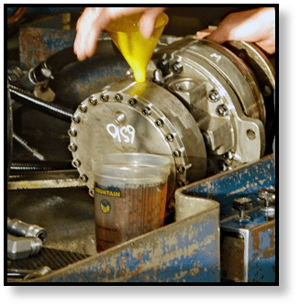Hydraulic fluid, sometimes referred to as hydraulic oil, is the medium used to transmit power in hydraulic systems. It is a complex liquid that has to serve many different purposes and posses many different characteristics. In this Shop Talk Blog post, we are going to discuss the nature of hydraulic fluid, including what it’s made from, what properties it needs to have, and what fundamental properties makes it work so well.

Here are some other Shop Talk Blog posts you might enjoy ...
- Common Hydraulic Fluid Issues
- Hydraulic Fluid Questions for Newbies
- Hydraulic Contamination Issues in Newer Machines
What Hydraulic Fluid is Made From
Hydraulic fluid consists of 99% base stock with about 1% additives. The most common base stock for modern hydraulic fluid is mineral oil, which is referred to as a Group I base oil. Other types of base stock may be required for specialty purposes and may include fluids such as propylene glycol or silicone oils. Also, new biodegradable hydraulic fluids have been developed and may have a natural base such as canola oil. Additives are “added” (as the name implies) to give hydraulic fluids unique properties. Typical additives include corrosion inhibitors, anti-erosion additives, friction reducers, and anti-foamant. Additives can also be used to change the color of the fluid, which is why different brands are often different colors.
Properties of Hydraulic Fluid
Hydraulic fluid has to do much more than transmit power, however. It also acts as a lubricant. As a lubricant, it reduces friction and protects component surfaces that undergo metal-to-metal contact that can result in wear. It also helps keep components cool by conducting heat away. Hydraulic fluid also protects metal surfaces from corrosion, provides a viscous seal, and resists water. Hydraulic fluid should also have a low tendency to cavitate, be thermally and chemically stable, and have a near constant viscosity.
Viscosity of Hydraulic Fluid
The viscosity needs to be thin enough to reach the surfaces that need lubrication, but also thick enough to stay where it's needed. It also has to be thin enough for the fluid to pass through valves, hoses, manifolds, and connectors. Hydraulic fluid needs to have a consistent viscosity over a range of temperatures. Consistent viscosity is necessary so that it doesn’t get too thick to flow at cooler temperatures while still being thick enough to do the job at extremely high temperatures. However, as important as viscosity is, it doesn’t overshadow incompressibility.
Incompressibility of Hydraulic Fluid

Conclusion
Hydraulic fluid is the lifeblood of your hydraulic system. That’s why it is so important that you use the appropriate type of fluid, change it out according to manufacturer guidelines, and protect it from contamination.

